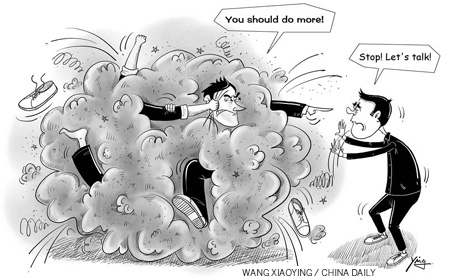US key to peace on Korean Peninsula

Several countries have blamed China for the exchange of fire between the Democratic People's Republic of Korea (DPRK) and the Republic of Korea (ROK) last week. Many media outlets in the United States, Japan and the ROK have been particularly critical of Beijing.
But this is not the first time that they are making China the scapegoat. They tried to blame China when the DPRK conducted the second nuclear test in May and even for the Cheonan incident in March. It's easy for them to pass the buck by urging China to exert pressure on the DPRK to reach a compromise. They think that only by criticizing the DPRK and influencing its decisions can China play the role of a responsible power. But what they have forgotten in the process is that they too should make efforts to ease tension on the Korean Peninsula.
As a friendly neighbor of the DPRK, China has been helping it to develop its economy and raise the living standards of its people. It is true, too, that the two neighbors have relatively close economic and political relations.
China does have a certain amount of influence on the DPRK. But that does not mean that it can turn it into pressure. Contrary to some countries' allegations, China has been using this influence to maintain peace since the second nuclear crisis broke out on the peninsula. Beijing, however, wants all countries involved in the Six-Party Talks to take up equal responsibilities to diffuse the tension on the peninsula.
China has continued playing its constructive role after the exchange of fire by communicating and coordinating with various sides. Its State Councilor Dai Bingguo has already visited the ROK to persuade it to help start a six-party emergency meeting. But the US, guided by the policy of "strategic patience", is not in favor of resuming the talks. Instead, it believes in imposing more sanctions on the DPRK.
It is clear that China's approach to the Korean Peninsula issue is different from that of the US and the ROK. Condemning the DPRK can satisfy some countries, but it will not change Pyongyang's decisions. When it comes to its government's survival and state security, the DPRK will do whatever it deems fit to be done. No amount of external pressure is likely to change that.
For instance, despite China's strong opposition, the DPRK conducted a long-range missile test in July 2006. Thee months later it even carried out its first nuclear test. The world has to understand that the DPRK makes its security decisions independently.
 0
0 







Go to Forum >>0 Comments